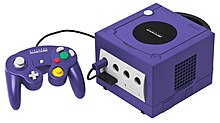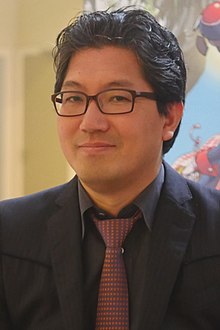Portal:Video games
The Video Games Portal

A video game, sometimes further qualified as a computer game, is an electronic game that involves interaction with a user interface or input device (such as a joystick, controller, keyboard, or motion sensing device) to generate visual feedback from a display device, most commonly shown in a video format on a television set, computer monitor, flat-panel display or touchscreen on handheld devices, or a virtual reality headset. Most modern video games are audiovisual, with audio complement delivered through speakers or headphones, and sometimes also with other types of sensory feedback (e.g., haptic technology that provides tactile sensations). Some video games also allow microphone and webcam inputs for in-game chatting and livestreaming.
Video games are typically categorized according to their hardware platform, which traditionally includes arcade video games, console games, and computer games (which includes LAN games, online games, and browser games). More recently, the video game industry has expanded onto mobile gaming through mobile devices (such as smartphones and tablet computers), virtual and augmented reality systems, and remote cloud gaming. Video games are also classified into a wide range of genres based on their style of gameplay and target audience. (Full article...)
Featured articles –
Set in a fictional version of classical Japan, Ōkami combines Japanese mythology and folklore to tell the story of how the land was saved from darkness by the Shinto sun goddess Amaterasu, who took the form of a white wolf. It features a sumi-e-inspired cel-shaded visual style and the Celestial Brush, a gesture-system to perform miracles. The game was planned to use more traditional realistic rendering, but this had put a strain on the graphics processing of the PlayStation 2. Clover Studio switched to a cel-shaded style to reduce the processing, which led to the Celestial Brush concept. The gameplay is modeled on The Legend of Zelda, one of director Hideki Kamiya's favorite series. The game's name is a pun, as "ōkami" can mean either "great god" (大神) or "wolf" (狼) in Japanese.
Ōkami was one of the last PlayStation 2 games released prior to the release of the PlayStation 3. It was not commercially successful, leading to the closure of Clover Studio following the departure of Kamiya and other leads on the game. Although it suffered from poor sales, the game received critical acclaim, earning IGN's 2006 Game of the Year. The Wii version earned similar praise, though the motion control scheme received mixed reviews. A high-definition port, remastered by Capcom and HexaDrive, was released on the PlayStation 3 via the PlayStation Network in October 2012 and for retail in Japan in November, supporting the use of the PlayStation Move motion controller. The port was released for PlayStation 4, Windows, and Xbox One in December 2017 worldwide, for the Nintendo Switch in August 2018, and for Amazon Luna in April 2022. Mainstream adoption of the game has improved with the release of these remasters, and Ōkami is considered to be one of the best video games ever made, as well as an example of video games as an art form, aided by the improved art details and graphics resolutions. (Full article...)
Did you know... -
- ... that the science-fiction video game The Anacrusis is named after a musical term?
- ... that Goodboy Galaxy was the first commercially released video game for the Game Boy Advance in more than 13 years?
- ... that the 2005 video game Bokura no Kazoku was inspired in part by the birth of its creator's first child?
- ... that Justin Yu, the current Classic Tetris World Champion, is also a cellist in MIT's video game orchestra?
- ... that the video game Serious Sam: Tormental was originally inspired by Geometry Wars?
- ... that match-three video games such as Candy Crush Saga are often considered to be Bejeweled clones?
- ... that a cheat code in the video game Spyro: Year of the Dragon grants access to a near-complete copy of Crash Bash?
- ... that Rockstar Vienna was the largest video game developer in Austria when it closed in 2006?
- ... that for at least 90 minutes, Mori Calliope livestreamed herself begging video game developer Atlus to allow her to stream their game Persona 3?
- ... that Rawson Stovall became the first nationally syndicated video game journalist in the United States when he was only eleven years old?
- ... that deceased YouTuber Technoblade beat the video game Minecraft in hardcore mode using a racing-wheel controller?
- ... that the video game mode Ultimate Team has been criticized for its reliance on loot box packs, considered to be a controversial form of gambling?
Selected biography –
Selected image -
Recent video game-related events
- January 16, 2025 –
- Nintendo officially reveals the Nintendo Switch 2 video game console, the successor to the Nintendo Switch. (Nintendo)
- September 12, 2024 – 2023–2024 video game industry layoffs
- Microsoft announces that it will lay off 650 Microsoft Gaming employees as part of cuts to its workforce. (Variety)
- August 15, 2024 –
- American video game magazine Game Informer discontinues publication after 33 years. The magazine's website is also shut down. (BBC News)
Topics
Categories
Things you can do
Summary of Video games WikiProject open tasks
| |
|
AfDs
Merge discussions
|
Other discussions
No major discussions
Good article nominations
DYK nominations
|
Articles that need...
| |
In other Wikimedia projects
The following Wikimedia Foundation sister projects provide more on this subject:
-
Commons
Free media repository -
Wikibooks
Free textbooks and manuals -
Wikidata
Free knowledge base -
Wikinews
Free-content news -
Wikiquote
Collection of quotations -
Wikisource
Free-content library -
Wikiversity
Free learning tools -
Wiktionary
Dictionary and thesaurus













































